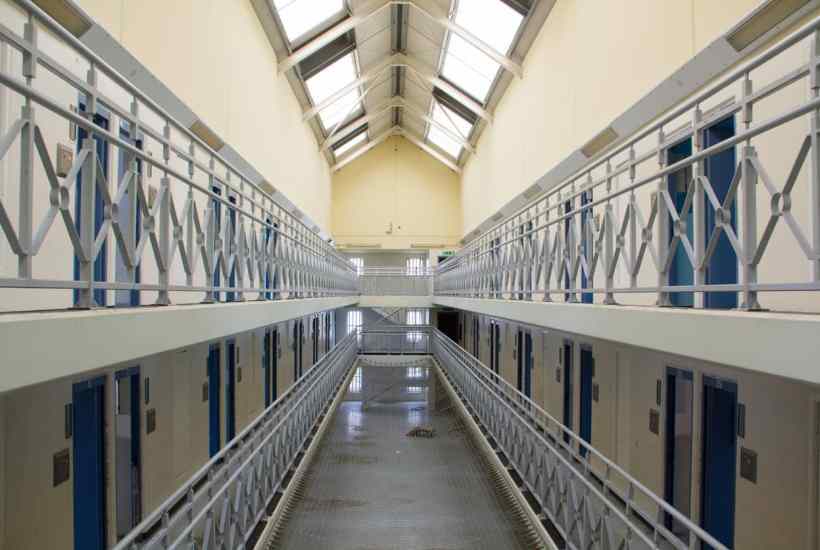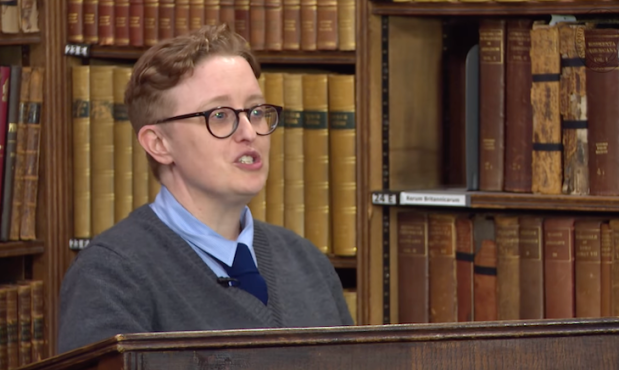This week it was reported that a male convicted murderer in Scotland has not only been allowed to self-identity on the female prison estate, but had gone one step further and demanded that the guards treat them as a baby. Sophie Eastwood was initially jailed for a driving offence in 2004, but went on to kill a former cellmate with shoelaces. Eastwood received a life sentence in the Polmont prison for women. Far from settling in, Eastwood is alleged to have demanded that prison officials cater to surprising demands: from nappies and baby food, to the expectation that guards hold their hand.
Instead of rejecting these demands, officials are acquiescing and have reportedly given Eastwood a dummy. How have we ended up in a position where prison guards are bending over backwards to accommodate a male murderer housed in a female prison? And does anyone care about the women these male convicts are housed with? Earlier this month, the feminist organisation Keep Prisons Single-Sex held a large protest outside Polmont carrying signs stating ‘Women are not human shields’ and ‘No to Self-Id’. But is anyone listening?
This year, the Sunday Times reported that male prisoners who identify as women in order to be transferred to the female estate often change back to identifying as their original sex once they are released. Meanwhile female prisoners are forced to share the prison estate with people who are taking advantage of the prison rules.
Britain is not alone in its approach. The trend of housing male prisoners who identify as women in the female estate is a worldwide phenomenon, with countries like Canada, the United States and Spain leading the way. The determination to impose ‘gender identity’ in all contexts has created many casualties, including women’s legal protections, children’s health and democratic principles.
Women who have been in prison know this too well. Amie Ichikawa, Executive Director of Woman II Woman, a non-profit organisation of formerly imprisoned women, reflects:
‘Incarcerated women are the least cared about and least valuable sector of women in modern society. Incarcerated women are judged by a different standard. Free women still have limited rights in society, so incarcerated women have next to none and really don’t matter.
Many people have told me: “Well you wanted equality, didn’t you?” This is in no way creating equality. Men are not forced to be more accepting of equivalent demands. I think the more modern woke feminists have played a part in the situation we are in. The excessive desire for inclusivity has become dangerous when it comes to women’s prisons.’
Prison officials often claim they take every precaution to ensure everyone’s rights are balanced and protected but female prisoners are being forced into accommodating males found guilty of murder (including serial killers), physical assault and rape.
According to statistics from the Prison Reform Trust in 2019, women in England and Wales represent less than 5 per cent of the prison population and 82 per cent of women sentenced to prison had committed a non-violent crime. Meanwhile, a 30-year Swedish study suggests that male prisoners who identify as women retain the same pattern of criminality as other men. And further evidence from the University of California suggests 20 per cent of transgender prisoners in California prisons are registered sex offenders.
A large majority of women in prison are themselves victims of male violence. This raises questions about the treatment of women considered most disposable in society. A letter to prison officials in California written by Woman II Woman asked:
‘What predator wouldn’t take advantage of the opportunity to serve their sentence surrounded by potential new victims who are too scared to stand up for themselves?
These women are trying to learn how to heal, and now they’re making sleep schedules so that one woman is always on watch to make sure no one gets raped. The women ask us every day for help and for answers about why this is being done to them.’
The brutal answer may be that while women in prison stand convicted of committing crimes, they are moreover guilty of stepping outside the line of patriarchal expectations, which is infinitely worse. Before women even step foot inside a prison cell, societal stigma has them as fallen women deserving vilification.
Analysed this way, it feels like including significant numbers of violent males in close quarters with female victims with no way out is the final step of a dehumanising process. This has been enabled by the state and politicians, but also by social justice movements meant to advocate for women. Institutionalised feminism has played a big role in making incarcerated women invisible.
Mostly disenfranchised from political life, incarcerated women are of little interest to politicians obsessed about re-election cycles. Prisoners cannot engage in hashtag activism. Gone are the days when campaigners like Julie Bindel were celebrated for fighting for women in prison. Today, a social media obsessed feminist movement puts hashtag activism on a pedestal while denouncing victims of male violence like JK Rowling as bigots for clickbait.
Who does a female prisoner complain to when the prison guards tasked with protecting her have been trained to prioritise the feelings of males housed in prisons built for women? What started as partisan ponderings about ‘what is a woman?’ has resulted in victims of male abuse being locked in enclosed spaces with violent men. For proponents of ‘gender identity’ policies, is that victory worth boasting about?
Got something to add? Join the discussion and comment below.
Get 10 issues for just $10
Subscribe to The Spectator Australia today for the next 10 magazine issues, plus full online access, for just $10.




















Comments
Don't miss out
Join the conversation with other Spectator Australia readers. Subscribe to leave a comment.
SUBSCRIBEAlready a subscriber? Log in